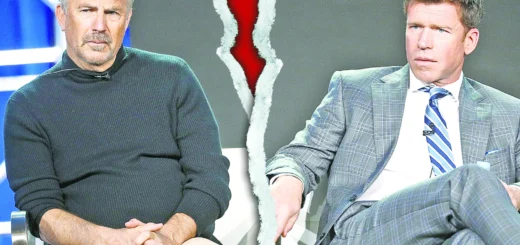“Kevin Costner’s Horizon: An American Saga – Part 1: A Cinematic Epic with a Novelistic Flair”
We love a bold, ambitious project, don’t we? There’s something captivating about grand, artistic endeavors, and right now we’re witnessing two of the most audacious ones in recent memory.
One is Francis Ford Coppola’s Megalopolis; the esteemed filmmaker’s self-financed epic has already perplexed critics and festival audiences and is poised to do the same upon its wider release. The other is Kevin Costner’s historical drama Horizon: An American Saga, with Part 1 now available on streaming service Stan. The simultaneous arrival of these two projects is arguably the only context in which Coppola and Costner are frequently compared—beyond alphabetical lists, that is—but their similarities are striking. Both have invested their own fortunes—Coppola sold his wineries to fund Megalopolis, while Costner mortgaged his $145 million Santa Monica estate for Horizon. Both have been working on their films since the 1980s. Most importantly, neither appears concerned with box office success—they’re driven, they say, by the pursuit of art.
Such grand ambition deserves admiration. And Horizon is nothing if not ambitious. It’s a planned four-part series, with Part 2 set to premiere at the Venice International Film Festival later this month; Part 3 is currently in production, and Part 4 is in pre-production. But Horizon isn’t just a series of four films; it’s one story split into four chapters, which might make it better suited to streaming rather than theatrical release. Having watched Part 1, Costner’s approach feels novelistic—not a quick, disposable read, but one of those hefty, challenging books that demands your full attention, with the hope that you’ll navigate through its depths to reach a satisfying conclusion.
As a Western, a genre Costner knows well—having starred in Lawrence Kasdan’s 1985 film Silverado, and recently achieved renewed fame with Taylor Sheridan’s popular TV series Yellowstone, not to mention his directorial and starring roles in Dances with Wolves (1990) and Open Range (2003)—Horizon embraces the genre with operatic flair. Set in the 1860s amid the Civil War, it chronicles the struggles of various characters as they seek to establish themselves on the frontier.
Costner himself plays Hayes Ellison, a horse trader on the run with Marigold (Abbey Lee), a prostitute, and a helpless toddler abandoned by Jena Malone’s runaway bride, while being pursued by the vengeful family of her murdered husband.
Simultaneously, Luke Wilson’s Matthew Van Weyden leads a wagon train to Horizon, facing challenges from inexperienced settlers, difficult trail hands, and the constant threat of attacks by hostile natives. One particularly harrowing raid on the town spurs a third storyline, where Sienna Miller’s widowed Frances Kittridge tries to rebuild her life after the attack, and the freshly orphaned teenager Russell (Etienne Kellici) joins Jeff Fahey’s band of scalp hunters to track down Pionsenay (Owen Crow Shoe), the Apache leader responsible for the raid. Meanwhile, the local Army garrison, including Michael Rooker’s pragmatic veteran, Sam Worthington’s idealistic lieutenant, and Danny Huston’s callous commander, each presents a different perspective on the defense of Horizon.
Cinematographer J. Michael Muro captures it all in stunning widescreen, highlighting both the expansive landscapes and the weather-beaten faces of the characters. The film’s breathtaking visuals contrast sharply with its frequent and visceral violence. The Western frontier depicted here is a harsh, unforgiving place where death is ever-present, and mercy is scarce. The violence is never gratuitous, each death resonating with real impact, making the film’s portrayal of frontier life all the more powerful.


